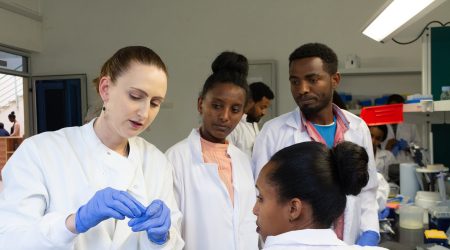RevGenUK – reverse genetics goes forwards

RevGenUK, the mutation detection service based at the John Innes Centre is poised to take advantage of the newest advances in genomic technology, supported by The Genome Analysis Centre (TGAC) Capacity and Capability Challenge Programme.
TGAC and the John Innes Centre are Institutes of the Biotechnology and Biological Sciences Research Council (BBSRC), and co-located on the Norwich Research Park.
John Innes Centre scientists running the mutation detection service, RevGenUK, and colleagues are to develop high throughput genome sequencing technologies for the isolation of mutations in known genes.
This work is being supported by The Genome Analysis Centre Capacity and Capability Challenge Programme (CCC), that offers UK researchers the opportunity to engage with the Centre’s new sequencing and bioinformatics facilities.
One way that scientists can characterise the function of a gene of interest is by observing what happens to an organism when that gene is not operating correctly. This requires an organism, for example, a plant, carrying a mutated version of the gene.
RevGenUK is a resource for the plant science community that provides a mutation detection service in several model species that are commonly used as research tools.
The process of mutating a gene and then investigating the effect on the organism is known as “reverse genetics” and is distinct from classical “forward genetics” where the effect or trait is first observed and the genetic basis, or mutation, is subsequently uncovered.
Supported by the BBSRC RevGenUK generates large populations of mutated plants, each carrying thousands of defective genes.
A process, known as TILLING (Targeting Induced Local Lesions IN Genomes) including the use of specialised technology, is then used to identify the plants within that population that carry mutations in a particular gene of interest. Seeds harvested from the plants carrying the defective gene are supplied to researchers for their own studies.
Currently, RevGenUK offers mutation detection in three plant species. Two of these, Lotus japonicus and Medicago truncatula, are models for legume genomics.
One important application of this research is the study of the symbiotic relationship some legumes have with soil bacteria that convert nitrogen in the air into a form that the plant can use for growth.
In an agricultural context, this means that these crops require much less nitrogenous fertiliser.
A long-term aim of this research would be to transfer the genetics controlling this process into non-leguminous crops, so greatly reducing the environmental and economic burden fertiliser applications place on farming.
The other plant species currently offered by RevGenUK is Brassica rapa.
Using this oilseed crop, scientists can convert knowledge gained in Árabidopsis thaliana into agriculturally relevant species.
Arabidopsis, a member of the Brassica family, is the most commonly used plant in research due to its simple lifecycle and genetics, but to apply this knowledge to more complex plants isn’t necessarily simple.
The resources available through RevGenUK will help scientists translate research in Arabidopsis into economically important crop species, such as oilseed rape and brings together the John Innes Centre’s expertise for mutation detection by TILLING with the BBSRC’s investment in genomic resources.
The data are collated in an open source web database which will be a useful resource for functional genomics as well as mutation discovery.
Currently RevGenUK uses established molecular biology and conventional DNA sequencing technologies to discover mutations.
Supported by The Genome Analysis Centre Capacity and Capability Challenge Programme, RevGenUK is now developing strategies for mutation discovery using cutting-edge next-generation sequencing. Exploring these new and more efficient technologies raises the possibility of expanding the service to include a wider range of species.
RevGenUK also helps to set up similar platforms elsewhere in UK and abroad. It has already helped set up a platform for rice and is in the process of helping to develop the same for sweet sorghum at the Institute of Botany (IOB) of the Chinese Academy of Sciences in Beijing.



